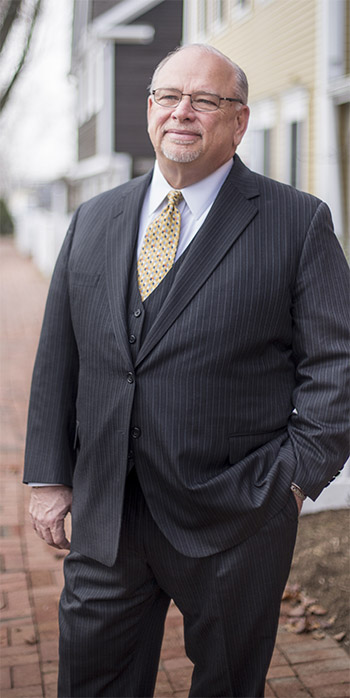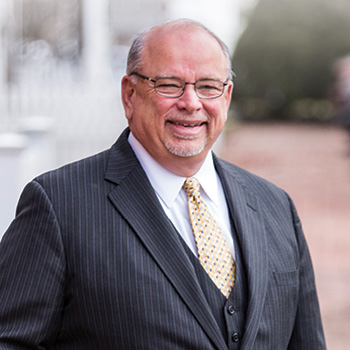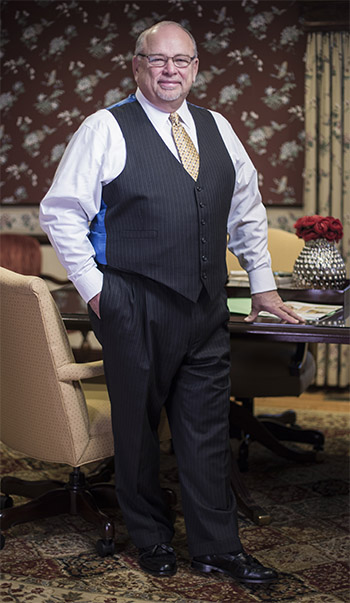In command of the complex

Gene Harris • North Haven, CT
Eugene W. Harris & Company • Lincoln Financial Securities Corp.
Read full biography below
Proactive Advisor Magazine: Gene, talk about your first career in law enforcement and how that might influence your work as a financial advisor.
I was with the City of New Haven police department for just over 14 years, and I was able to do well on promotional exams and to take advantage of many opportunities. I advanced through the department quickly, starting as a patrol officer, then into the investigative services unit, and finally became a lieutenant in charge of the training academy and also commanded emergency services units.
I think there were many lessons for anyone looking to be successful: discipline, hard work and study, leadership, and caring for the needs of others. I have actively applied my educational background and training, been able to work well under conditions of pressure and uncertainty, and have found ways to communicate effectively with people who have diverse backgrounds and interests. I would say that is very closely related to what we try to do to be successful advisors every day.
What gives you the greatest satisfaction as a financial advisor?
It is being able to really drill down with people on the issues that are keeping them awake at night and presenting stress in their financial lives. On the flip side, I enjoy working to find actionable ways to help them achieve the goals that are most meaningful in their lives.
 I work with a wide range of people—all ages, professions, and backgrounds—but the bulk of our clients are in the planning stages for retirement or already retired. The issues they are facing can appear to be overwhelming in both number and complexity. They need to make decisions about Social Security, Medicare, long-term care and health insurance, life insurance, legacy planning, tax planning, investment planning, and on and on.
I work with a wide range of people—all ages, professions, and backgrounds—but the bulk of our clients are in the planning stages for retirement or already retired. The issues they are facing can appear to be overwhelming in both number and complexity. They need to make decisions about Social Security, Medicare, long-term care and health insurance, life insurance, legacy planning, tax planning, investment planning, and on and on.
My process includes a lengthy discussion in the first few meetings that really covers the waterfront of what they are currently doing in their financial, retirement, and insurance portfolios; where the gaps are; and what broad objectives they are seeking to establish. Over the following series of meetings, I establish the broad outline of a financial plan.
But at the same time I use a very focused process of trying to resolve one problem area or need at a time. If, for example, someone is worried about funding long-term care for their elderly parents, we take that issue head-on and keep working on it until we have found some reasonable alternative approaches. Then, in our next meeting, we will tackle the next most pressing concern. I have found that this approach of breaking things down into smaller pieces to be quite effective, along with keeping the terminology at an easy-to-digest level. Clients find it more manageable to deal with and appreciate seeing tangible solutions being put in place for their biggest worry points.
Please describe your investment planning process.
Let me use a hypothetical client couple that is just a few years away from retirement. We have had the in-depth conversation about their financial situation, addressed their immediate concerns, and have taken a broad look at what they are thinking about for retirement.
This is where we now need to get very specific and examine all of their potential income sources and their potential financial obligations and expenses. Will they be selling their home? Do they have elder-care expenses or do they need to provide living accommodations for children or other relatives? Will they continue to work in semiretirement? How important is it to them to leave some sort of inheritance?
Through this kind of needs-and-resources assessment we can set up realistic goals for the income they need to generate in retirement. Then it turns to a serious discussion of their appetite for risk and their attitudes toward asset preservation. Depending on those answers, for most people it comes down to some combination of guaranteed-income products and investments that can provide some growth over time. And that’s where it comes to the point of building the asset-allocation models so they fall in line with personal risk tolerances.
What is a common issue you face in managing clients’ money?
A major concern has to be the very short memory of people when it comes to market risk. I actually keep some old newspaper front pages in my office to jog people’s memory as to how bad it was in the credit crisis and market crash of 2007–9. The volatility of the market was incredible, and showing these headlines helps lead to a real-life discussion of how much risk and volatility a client can comfortably handle.
I tell them that we are not interested in setting up an investment plan that is dependent on picking hot stocks, trying to outguess the market, or overly worrying about the daily moves of the indexes. We are interested in setting up a long-term investment approach that will help smooth out some of that volatility and serve them well over the rest of their lives.
I tell people I may not be the smartest person they will meet, but I am smart enough to know I am not an expert at the ongoing management of investments. That’s why I reach out to third-party managers that have the expertise and the track record to manage investment portfolios based on specific risk parameters. In general, we are less interested in trying to hit investment home runs than in trying to make sure client portfolios are managed with the level of risk appropriate for each client. Our primary goal is the long-term accumulation and building of wealth to fund income in retirement.
The selection process of third-party managers is very critical to my practice. I conduct my own due diligence, in addition to that which is performed at the broker-dealer level. I want to have a thorough understanding of their technical capabilities in the field of investment management, as well as a high degree of trust in their processes and people. Like all other aspects of my role as an advisor, relationships are extremely important.
I have a fiduciary responsibility for my clients’ accounts and the recommended strategies that are being presented. I am not talking primarily about returns as related to strategies, but more about the fact that a money-management firm will smoothly handle all aspects of a client account and that they will execute their strategies as represented. I want my clients to sleep well at night, knowing their investments are being handled with a high degree of professionalism. People come to our firm for help in mapping out their financial futures—we take that responsibility and those relationships very seriously.
 Eugene (Gene) Harris is the owner and president of Eugene W. Harris & Company Wealth Management in North Haven, Connecticut. He is a registered representative with Lincoln Financial Securities Corp. His firm was founded over 25 years ago and offers many financial planning, insurance, investment, estate planning, and tax preparation products and services. Mr. Harris says his firm’s goal has always been to “meet the unique needs of each and every client through a variety of customized solutions.”
Eugene (Gene) Harris is the owner and president of Eugene W. Harris & Company Wealth Management in North Haven, Connecticut. He is a registered representative with Lincoln Financial Securities Corp. His firm was founded over 25 years ago and offers many financial planning, insurance, investment, estate planning, and tax preparation products and services. Mr. Harris says his firm’s goal has always been to “meet the unique needs of each and every client through a variety of customized solutions.”
Born and raised in New York City, Mr. Harris received his bachelor’s and master’s degrees in education from Southern Connecticut State University and has been heavily involved with the City of New Haven ever since. He joined the New Haven Police Department in 1974 and served in several different positions of increasing responsibility. He was a lieutenant in charge of the training division at the time of his retirement. While still on the police force, Mr. Harris began his second career in financial planning.
Mr. Harris is currently a member of the New Haven Country Club, the Graduate Club, and the Knights of Columbus. “Giving back to the community is a very high priority for me,” says Mr. Harris, who also spends his time serving on many nonprofit boards. These include the Boys & Girls Club of New Haven, Cardinal Hayes High School, New Haven Country Club, St. Bernadette Church, and Sacred Heart Academy.
Mr. Harris resides in North Haven and has three adult daughters. He says his clients, family, and volunteer involvement keep him extremely busy, but he “still likes to find the time for an occasional round of golf.”
Disclosure: Eugene W. Harris is a registered representative of Lincoln Financial Securities Corp. Securities and investment advisory services offered through Lincoln Financial Securities Corp., a broker/dealer and registered investment advisor, member SIPC. Insurance offered through Lincoln affiliates and other fine companies. It is not our position to offer legal or tax advice. Branch office: 250 State Street Unit B-1, Sturbridge Commons, North Haven, CT 06473. Eugene W. Harris & Company and Lincoln Financial Securities are not affiliated. LFS-1425287-022216
Photography by Chris Beauchamps


